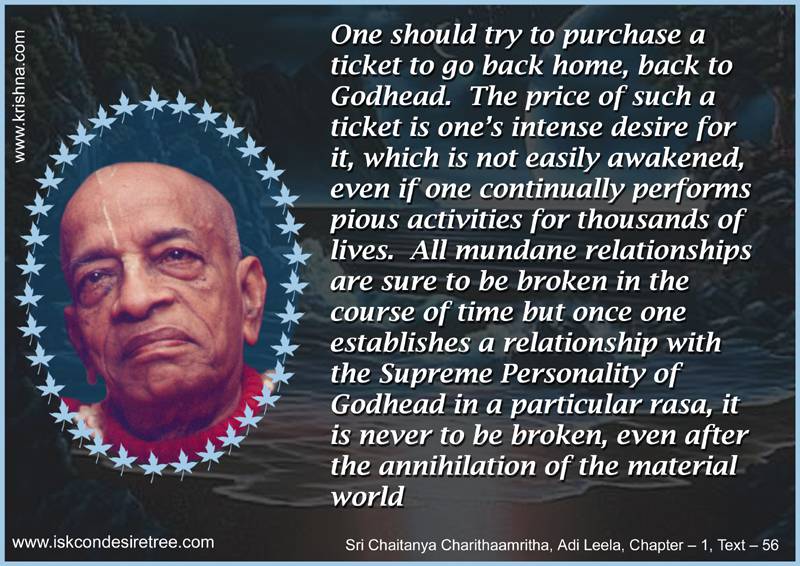Hare Krishna.
14th March, 2015. Gurgaon
Q: Who are the three enemies of living entities in the material world ?
Ans : Desire, anger and lust
tad vām amuṣya paramasya vikuṇṭha-bhartuḥ kartuḿ prakṛṣṭam iha dhīmahi manda-dhībhyām
lokān ito vrajatam antara-bhāva-dṛṣṭyā pāpīyasas traya ime ripavo ‘sya yatra (SB 3.15.34)
Translation
Therefore let us consider how these two contaminated persons should be punished. The punishment should be apt, for thus benefit can eventually be bestowed upon them. Since they find duality in the existence of Vaikuṇṭha life, they are contaminated and should be removed from this place to the material world, where the living entities have three kinds of enemies.
Purport:
The reason why pure souls come into the existential circumstances of the material world, which is considered to be the criminal department of the Supreme Lord, is stated in Bhagavad-gītā, Seventh Chapter, verse 27. It is stated that as long as a living entity is pure, he is in complete harmony with the desires of the Supreme Lord, but as soon as he becomes impure he is in disharmony with the desires of the Lord. By contamination he is forced to transfer to this material world, where the living entities have three enemies, namely desire, anger and lust.
These three enemies force the living entities to continue material existence, and when one is free from them he is eligible to enter the kingdom of God. One should not, therefore, be angry in the absence of an opportunity for sense gratification, and one should not be lusty to acquire more than necessary. In this verse it is clearly stated that the two doormen should be sent into the material world, where criminals are allowed to reside. Since the basic principles of criminality are sense gratification, anger and unnecessary lust, persons conducted by these three enemies of the living entity are never promoted to Vaikuṇṭhaloka. People should learn Bhagavad-gītā and accept the Supreme Personality of Godhead, Kṛṣṇa, as the Lord of everything; they should practice satisfying the senses of the Supreme Lord instead of trying to satisfy their own senses. Training in Kṛṣṇa consciousness will help one be promoted to Vaikuṇṭha.
Q: What is pulakāśru ?
Ans: Srila Prabhupada writes in his purport to sB 3.15.25 that when one is free from all ten of these offenses in chanting the holy name of God, he develops the ecstatic bodily features called pulakāśru. Pulaka means “symptoms of happiness,” and aśru means “tears in the eyes.” The symptoms of happiness and tears in the eyes must appear in a person who has chanted the holy name offenselessly.
Here in this verse it is stated that those who have actually developed the symptoms of happiness and tears in the eyes by chanting the glories of the Lord are eligible to enter the kingdom of God. In the Caitanya-caritāmṛta it is said that if one does not develop these symptoms while chanting Hare Kṛṣṇa, it is to be understood that he is still offensive.
What is the remedy ?
Caitanya-caritāmṛta suggests a nice remedy in this connection. There it is said in cc Adi Lila 8.31, that if anyone takes shelter of Lord Caitanya and just chants the holy name of the Lord, Hare Kṛṣṇa, he becomes freed from all offenses.
Q: Who is the younger brother of ‘desire’ ?
Ans : Anger!
Srila Prabhupada writes in purport of SB 3.15.31 `In this verse it is figuratively stated that the younger brother of desire suddenly appeared in person when the sages were forbidden to see their most beloved Personality of Godhead. The younger brother of desire is anger. If one’s desire is not fulfilled, the younger brother, anger, follows.
Q: Who is Viditātma-tattva ?
Ans : Srila Prabhupada writes in purport of SB 3.15.31 `In the previous verse it has been clearly mentioned that the Kumāras were liberated persons. Viditātma-tattva means “one who understands the truth of self-realization.” One who does not understand the truth of self-realization is called ignorant, but one who understands the self, the Superself, their interrelation, and activities in self-realization is called viditātma-tattva.
Q: Can we make a Vaikuntha in this material world also ?
Answer: Yes, Prabhupada writes in the purport of SB 3.15.33`Harmony or disharmony is realized because of the law and order of a particular place. Religion is the law and order of the Supreme Lord. In the Śrīmad Bhagavad-gītā we find that religion means devotional service, or Kṛṣṇa consciousness. Kṛṣṇa says, “Give up all other religious principles and simply become a soul surrendered unto Me.” This is religion. When one is fully conscious that Kṛṣṇa is the supreme enjoyer and Supreme Lord and one acts accordingly, that is real religion. Anything which goes against this principle is not religion. Kṛṣṇa therefore says: “Just give up all other religious principles.” In the spiritual world this religious principle of Kṛṣṇa consciousness is maintained in harmony, and therefore that world is called Vaikuṇṭha. If the same principles can be adopted here, wholly or partially, then it is also Vaikuṇṭha. So it is with any society, such as the International Society for Krishna Consciousness: If the members of the International Society for Krishna Consciousness, putting faith in Kṛṣṇa as the center, live in harmony according to the order and principles of Bhagavad-gītā, then they are living in Vaikuṇṭha, not in this material world.
All glories to the wonderful purports of Srila Prabhupada.
All glories to Sri Guru and Gauranga.
All glories to Srila Prabhupada.

